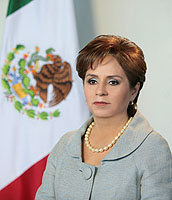|
 |
|
Patricia Espinosa-Cantellano | Mexico hosts this coming weekend, 19-20 February 2012, an informal meeting of G20 foreign ministers in Los Cabos, the coastal resort where the G20 Summit will take place next June. The idea is to hold a brainstorming exercise on today's most salient issues of global governance, drawing on the vision and experience in multilateral affairs of more than twenty foreign ministries across the world.
The fact that this is an informal exercise does not in any way diminish its relevance. For many, the key word during this year's Summit will be leadership. In a context of declining economic prospects and pressing global challenges that demand collective action, the current sense of impasse in multilateral institutions should concern us all. There seems to be a global governance gap, one that the G20 is called upon to bridge by providing a more vigorous and effective leadership. Having the foreign ministers of some of the most active countries in international affairs discussing openly and freely ways to improve global governance should be a welcome step forward.
The world is running out of time as it faces major challenges in a number of fronts that demand concerted action. Multilateral institutions keep working on these and other areas at a pace that is hardly encouraging. Even before the G20 was formalized as a high level forum in 2008, other groups such as the Group of Eight (G8), or the G8+5, where emerging economies played a role, were actively engaged in addressing challenging global economic and financial issues. In spite of the entrenched skepticism that often surrounds leaders' summits, the very fact that G20 countries have been effective in tackling difficult global economic problems by discouraging unilateral measures and fostering policy coherence makes the prospect of successful concerted action on other global matters all the more promising.
Breathtaking technological and political changes have led global economic, social, and political activity to evolve in a way that makes it difficult for many multilateral institutions to meet ever rising expectations. Global governance regimes and mechanisms need clear and decisive political guidance in order to fulfill their mandates. Current difficulties notwithstanding, the multilateral system remains our best international guarantee of stability and legality. Only through leadership, rightly applied where it is most needed, can multilateral institutions be refocused to address the areas that require immediate attention.
Bearing this in mind, G20 foreign ministers and other participants will discuss a set of crucial questions on the most pressing challenges for global governance. These will touch on issues such as the role that the G20 should play in order to break persistent deadlocks in the multilateral system or the ways in which we can strengthen the rule of law within a complex and evolving international architecture. We will also explore alternatives to promoting green growth and green investment, as well as social development and food security.
Mexico believes that it is duty bound to invite G20 members and other countries to reflect on the current state of global governance. The ultimate goal of the forthcoming Ministerial meeting at Los Cabos is to seek new actions that can help us fulfill more effectively our global responsibilities for the benefit of each of our societies and of the world community as a whole.
|
